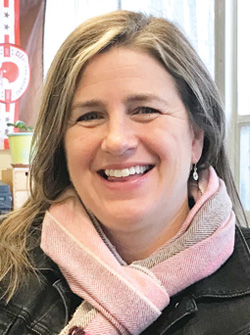South Suburban Montessori grows with the community
by Dan Holland
For Amy Mackie-Barr, head of South Suburban Montessori School, her journey into the specialized educational method began when she became a “Montessori parent” for her son at a Montessori school in Cleveland’s eastern suburbs many years ago.
“I started there as a Montessori parent and fell in love with it, and it all grew from there,” Mackie-Barr said. “I taught for a while, for about 13 years, as both an administrator and teacher in their toddler and kindergarten program. I then had the opportunity 16 years ago, in 2007, to become the head of the school here.”
The school, located on the Blossom Hill property in Brecksville, utilizes an educational method established by Dr. Maria Montessori, an Italian physician and educator best known for her philosophy of education. According to the school’s website, the method “approaches education by emphasizing the potential of each child and developing it through prepared environments of uniquely designed learning materials under the direction of trained Montessori teachers.”
The school currently has an enrollment of 200 students ranging in age from 18 months through age 14.
“The school was established by a group of area parents who wanted an alternative for their children’s education,” Mackie-Barr said. “It was started by a group of 13 parents who [formed a study group for their children] at the Brecksville Library, and the school grew out of that.”
The school went through a re-accreditation process last year to be recognized as an authentic Montessori school, as the title is not copyrighted, said Mackie-Barr.
“Ten years ago, we decided to go through an accreditation process with the American Montessori Society, which oversees quality Montessori education; philosophy and best school practices from governance to facilities to curriculum,” she said. “So, we determined it would be beneficial to set ourselves apart as an authentic Montessori school. We did that for the first time in 2013, and we were just re-accredited in 2022.”
A philosophy of “meeting a child where he or she is” – along with a humanities theme – is a common thread running through each grade level.
“Ultimately, Montessori is a theory of education,” Mackie-Barr said. “Our goal, first and foremost, is to help children develop the skills they are going to need to be creative, independent, articulate, well-rounded adults who care about other people, care about the world and the environment. So, there’s a huge humanity component that runs through the Montessori philosophy. Maria Montessori really felt that the goal of education is to change the world.”
“It is a very individualized approach to education in meeting that child where he or she is at,” added administrative assistant Amy Macy. “In the lower elementary level up through eighth grade, no two kids’ plans look alike; and you won’t find that in other places. You meet that child where he or she is at, and you developmentally move with them as slowly or quickly as they need to work.”
Mackie-Barr encourages parents to stop in to experience all the school has to offer.
“We love to have visitors, because Montessori is not something that most of us grew up with in education,” she said. “The big thing is that there are a lot of misconceptions about Montessori schools. Anyone who wants to learn more is welcome to come and see and learn. We want to educate and meet parents where they are in their journey as parents and meet the needs of their family.” ∞

